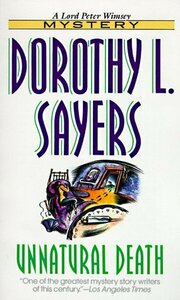You need to sign in or sign up before continuing.
Take a photo of a barcode or cover
adventurous
mysterious
slow-paced
Plot or Character Driven:
A mix
Strong character development:
Yes
Loveable characters:
Complicated
Diverse cast of characters:
No
Flaws of characters a main focus:
No
adventurous
challenging
mysterious
medium-paced
Plot or Character Driven:
A mix
Strong character development:
Complicated
Loveable characters:
Complicated
Diverse cast of characters:
No
Flaws of characters a main focus:
Complicated
June 2018-A charming mystery with a charming and energetic detective. I will say I'm still unclear as to the total motive of the murderer but I did like the clever way she almost got away with it. And I have to note that there are some antiquated views and slurs used. Those bits did make me uncomfortable. I do love Peter Wimsey and Bunter (we did not have enough Bunter in this book!). I even liked Climpson.
mysterious
tense
medium-paced
Plot or Character Driven:
Plot
Strong character development:
Yes
Loveable characters:
Yes
Diverse cast of characters:
Yes
Flaws of characters a main focus:
No
fast-paced
Plot or Character Driven:
Plot
Strong character development:
No
Loveable characters:
N/A
Diverse cast of characters:
No
Flaws of characters a main focus:
No
Used racist language
Moderate: Racism
medium-paced
Plot or Character Driven:
A mix
Strong character development:
No
Loveable characters:
No
Diverse cast of characters:
No
Flaws of characters a main focus:
No
I'm giving a rating of 4 stars, because it really is a fabulously well written story, which does some really interesting things with the plot, but I have significant misgivings about recommending it as something to read. I found it less objectionable in terms of racism and other issues than the Agatha Christie story of the same era that I read recently, but that is a low bar.
I don't think I've read a Lord Peter Wimsey story before -- I've read others of Sayer's works where Wimsey turns up as a character, and I'm less impressed than I might be. I found the general dubious methods of Wimsey's in investigating to be frustrating to read, although again, the writing is fabulous.
So, characterisation is strong, but I didn't like the characters. The world-building is well done, such that a century later I had a strong feel for what was going on despite not having an understanding of the time or place(s). The writing is fabulous, being the thing that kept me going when what I wanted to do was throw my hands up in the air and got 'what the f*?'. And the plot, if overwrought, went along at a good clip, and at no point did I consider it to be improbable, given the characters as presented.
In my reading notes I said: "Here, one of the failures of communication is that the signposts are in the process of being repainted, such that they are all white paint and no letters; and in one case the arms are all missing entirely. So, quite contrived. " -- I find it fascinating that one of the things that shows up consistently through this genre is that messages get missed, people end up in the wrong place, people get delayed by the most ridiculous of communication hiccups, and that even this early in the genre, that has to be contrived so as to drive the story.
Recommended for people who want something a bit on the easy reading side, who are prepared to deal with the period typical racism and anti-semitism that appears (argh) -- including slurs, and don't care too much for realism in their murder mysteries.
I don't think I've read a Lord Peter Wimsey story before -- I've read others of Sayer's works where Wimsey turns up as a character, and I'm less impressed than I might be. I found the general dubious methods of Wimsey's in investigating to be frustrating to read, although again, the writing is fabulous.
So, characterisation is strong, but I didn't like the characters. The world-building is well done, such that a century later I had a strong feel for what was going on despite not having an understanding of the time or place(s). The writing is fabulous, being the thing that kept me going when what I wanted to do was throw my hands up in the air and got 'what the f*?'. And the plot, if overwrought, went along at a good clip, and at no point did I consider it to be improbable, given the characters as presented.
In my reading notes I said: "Here, one of the failures of communication is that the signposts are in the process of being repainted, such that they are all white paint and no letters; and in one case the arms are all missing entirely. So, quite contrived. " -- I find it fascinating that one of the things that shows up consistently through this genre is that messages get missed, people end up in the wrong place, people get delayed by the most ridiculous of communication hiccups, and that even this early in the genre, that has to be contrived so as to drive the story.
Recommended for people who want something a bit on the easy reading side, who are prepared to deal with the period typical racism and anti-semitism that appears (argh) -- including slurs, and don't care too much for realism in their murder mysteries.
Moderate: Death, Racism
Minor: Antisemitism
The racism is what I would consider 'period typical', it shows up in character attitudes and uses of slurs.
Plus two stars for implied lesbians who are good, minus two stars for implied lesbian who is evil. I'm not at all sure that Sayers intended to be writing about lesbians at all.... Lots of racism, too.
I need more Bunter. That is mostly all. This was enjoyable and at moments thrilling. A twist I did not expect. And also a short story I definitely missed in between. I love love when Peter and Parker and Bunter are out in the field visiting pubs and whatnot. I can't decide which is my favourite of the three I've read so far, but I am definitely committed to the series and once I've read them all I'm sure I'll be watching the BBC show, too.
adventurous
mysterious
medium-paced
Plot or Character Driven:
Plot
Strong character development:
No
Loveable characters:
Complicated
Diverse cast of characters:
Complicated
Flaws of characters a main focus:
Complicated
adventurous
mysterious
tense
medium-paced
Plot or Character Driven:
Plot
Strong character development:
Complicated
Loveable characters:
Yes
Diverse cast of characters:
No
Flaws of characters a main focus:
No
Moderate: Cancer, Suicide, Medical content, Murder





